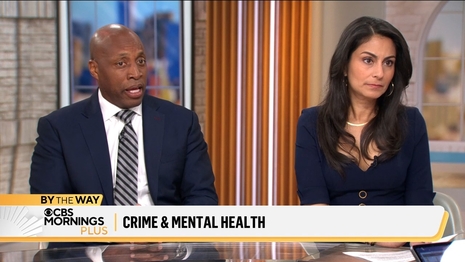 Tuesday’s CBS Morning Plus may have clinched the single dumbest and most tone-deaf segment on last month’s brutal murder of Ukrainian refugee Iryna Zarutska in Charlotte, North Carolina by declaring the murder was proof of a “mental health crisis…within this country” and that America has failed to properly “invest in” and “rehabilitate” people like the alleged killer, DeCarlos Brown Jr.
Tuesday’s CBS Morning Plus may have clinched the single dumbest and most tone-deaf segment on last month’s brutal murder of Ukrainian refugee Iryna Zarutska in Charlotte, North Carolina by declaring the murder was proof of a “mental health crisis…within this country” and that America has failed to properly “invest in” and “rehabilitate” people like the alleged killer, DeCarlos Brown Jr.
The claims were leveled by two CBS News contributors — former Suffolk County, New York Police Commissioner Rodney Harrison and KFF Health editor-at-large Dr. Céline Gounder — and despite solid, appropriate questions from co-host Tony Dokoupil and fill-in co-host Kelly O’Grady about the need for law and order.
Dokoupil set the table with a brief summary of the murder, adding “[i]t’s become quite a political matter” with Brown’s “history of mental health issues, including schizophrenia, and previously spent more than half a decade behind bars for robbery, had other run ins as well.”
“More than a third of convicted criminals in North Carolina are arrested again within two years of their release, and severe mental illness — illness plays a major role in how likely someone is to be arrested again…[T]he big question, the high stakes question, what does it take to break that cycle,” he added.
Harrison went first on recidivism, arguing NYPD tactics under past commissioner Bill Bratton did things such as “identif[ying] these individuals when they reenter back into society and making sure we have sustainable engagements with them to make sure they were headed in a better direction.”
How ridiculously simplistic.
O’Grady followed up with the fact that Brown had been “arrested 14 times” and “was out on cashless bail,” so it was clear he fell “through the cracks.”
Harrison insisted his three-decade career has been spent advocating for victims, but he certainly didn’t show it in lamenting these high-profile murders end up with “people…pointing fingers.”
Even after citing the 2022 murder of New York City resident Michelle Go (in which she was pushed into an incoming subway train), he said the real issue remains the need to address “the mental health crisis that’s going on within this country” (i.e. help those committing crimes).
Dokoupil went to Gounder and demanded to know “why [was] he still out on the street” despite having exhibited symptoms of schizophrenia and previously been involuntarily committed to a mental institution.
Yet again, the guest went off into crazy territory with the doctor lamenting “[o]ne of the highest risk periods of time is during the transition from incarceration to the community and there are programs…that have been successful by combining clinical care, mental health care, social workers, helping to stabilize people, get them into housing, get them ideally into jobs and into medical care.”
She cited a program in New York City as having done this, but fell by the wayside after “a big hospital system merger.”
She also delivered perhaps the craziest line:
Unfortunately, these kinds of programs are not big money and we have to decide that this is something as a community, we want to invest in, just as we need to invest in policing. If you want to be addressing the mental health issues of these folks and prevent the recidivism, you do need to be investing in mental health and stabilization.
Dokoupil and O’Grady continued to hit the proverbial on the head by wondering whether, at a certain point, some people are too dangerous to be allowed to roam.
Once again, Gounder and Harrison responded by continuing to advocate for the need to give more and more chances and taxpayer dollars to disturbed, violent offenders. Notice how Gounder even implied North Carolina had not done enough for Brown (and thus this tragedy occurred) (click “expand”):
O’GRADY: And this may be a controversial question, but I think a lot of parents are watching and thinking, well, that could have been my daughter, you know, whether it was Michelle or Iryna or all of these countless examples. Is there a point, Rodney, where it that person is too dangerous to themselves, to others, where you just say, we can’t have them on the streets?
HARRISON: Absolutely. But my question for the room is, what are the city managers doing to make sure they are investing in these individuals to get them to help? And if they are not responsive, then unfortunately they have to be in some type of custody.
DOKOUPIL: Dr. Gounder, is there such a thing as people who are beyond help, who have such a repeated pattern of violating society’s not only rules, norms, regulations, but also unable to to maintain the the clear functioning of mind to just be among us. I mean, is there a point in which this is just not working?
GOUNDER: Is there? Yes. But have you actually done the work to try to rehabilitate them? And in almost all cases, the answer is no. So you can’t really say that you’re going to throw people away until you’ve done the work of trying to rehabilitate, rehabilitate them. And that’s just not happening because we’re not investing enough in that process.
Dokoupil concluded with one final important question: “[T]he Catch-22 here is you don’t want to take people who have their freedoms as Americans…but you also don’t want to wait until they commit a heinous crime before you…get them off the street. What do we do?”
“Well, reentry is a privilege, and I think it’s important that individuals [are] identified. What are we looking to do to implement strategy, to get them the assistance? And what’s the next strategy to sustain that assistance? If you don’t put those three things together, you’re going to have these incidents happening over and over again,” Harrison replied.
To see the relevant CBS transcript from September 9, click here.














